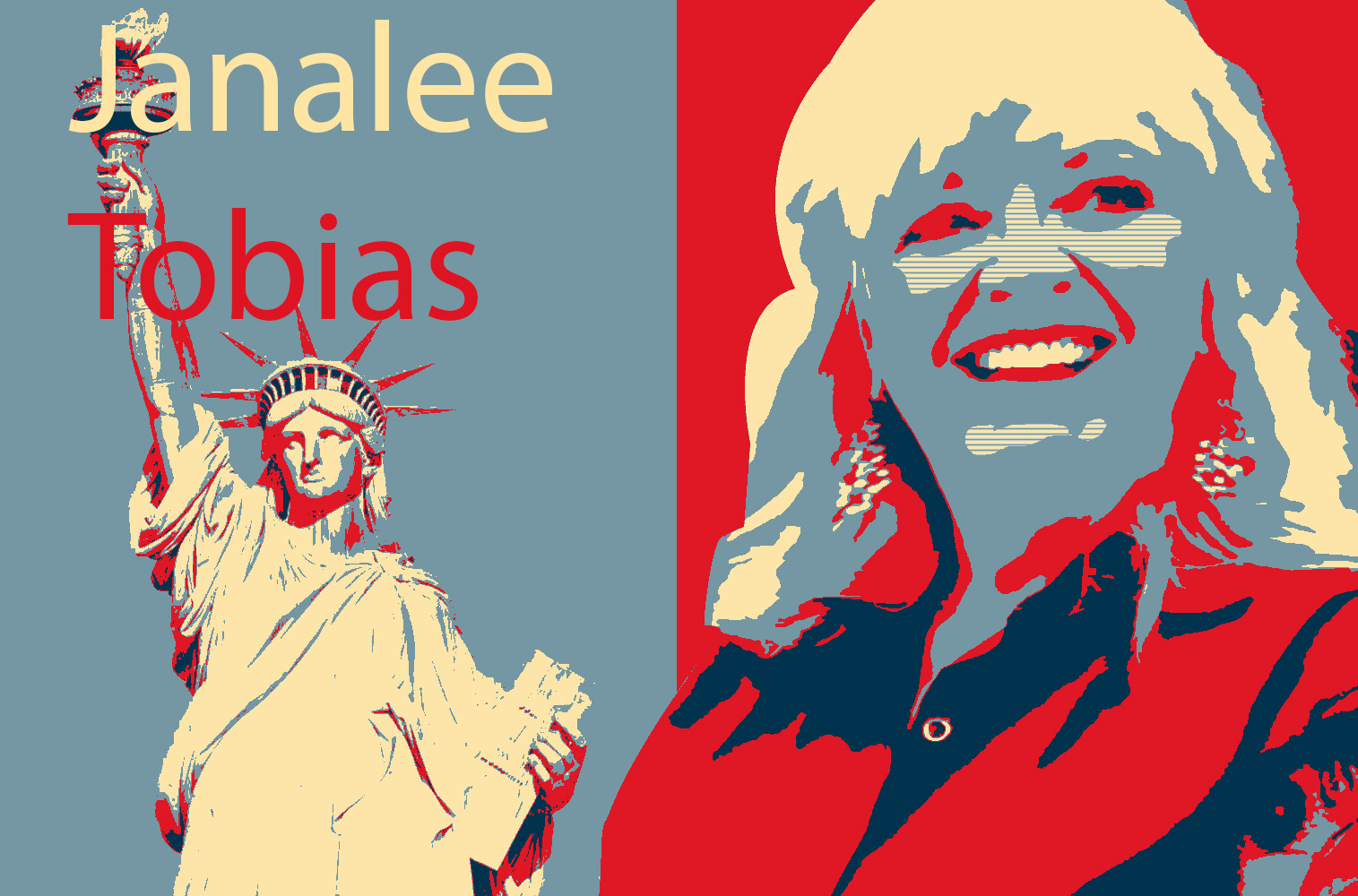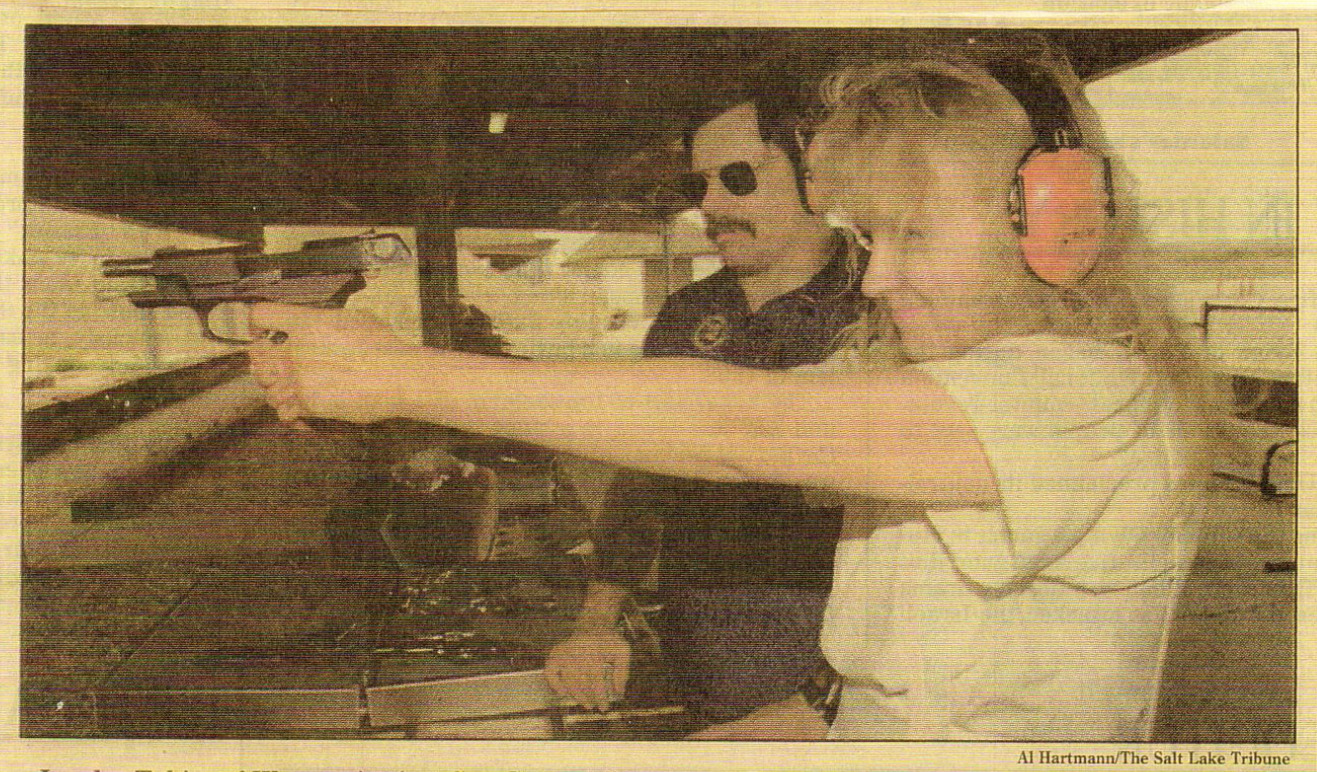
Standing by her kitchen island, which is covered in homemade posters, photo albums and newspaper clips, Janalee Tobias’ eyes are bright with recollection.
As she flips through the plastic-sleeve pages and unfolds a yellowed front page news story, she cannot help but retell an early chapter of her colorful story.
“I started out as a political activist when there were just newspapers and TV, passing out flyers,” she said.
Even after spending tireless decades as one of Utah’s most prominent gun rights activists, Tobias’ voice still travels with an energy that belies the exhaustion of organizing countless rallies and attending court hearings.
A first impression of Tobias will surely be one of kindness and amiability, but one also quickly learns the woman is fierce: fierce to love and fierce to defend the freedoms that made her into who she is.
“She has this fierceness for what she believes in,” fellow Utah gun rights advocate Villina Greenwell said. “That’s inspiring more than anything.”
This fierce passion for freedom finds its roots in the small Idaho town where Tobias was raised. “It’s the potato capitol of the world,” Tobias said of Shelley, Idaho.
The town is home to less than 5,000 people, many of them potato farmers and is located on the shores of the Snake River, just 10 miles south of Idaho Falls.
“When you drive through there during spud harvest, you can smell the potatoes,” she said with a smile revealing her love for the place. Her words transported the listener to Shelley’s main street where one could almost see the dusty road and hear the rumble of combines.
This rural childhood had a deep, almost spiritual influence on Tobias.
“I grew up in nature. I was nurtured by nature and I was outside every day,” she said, tears forming. “Why do I get so emotional about nature? Because it’s so healing.”
Her favorite thing about her home and the first thing she shows visitors is her backyard. Standing on her back porch, she soaks up the cool air from the natural duck pond and says how she wishes everyone had access to similar open spaces.
This desire to preserve and share what she holds most dear is what prompted Tobias as a young mother to protest encroachments on free speech, free people and free spaces.
When her first daughter, Lisa, was only a year old, Tobias was chosen to be the state delegate representing her community in Utah’s caucus convention system.
In this position, Tobias met with many legislators, judging their campaigns and their characters to determine which merited her support. She quickly became invested in a few core political causes, including imposing term limits for state legislators and stepping back regulations on gun use.
She began printing flyers and gathering signatures to bring awareness to these issues, all while carrying her baby.
“Everybody was like, ‘Who’s this lady dragging her kids around?’” Tobias said. “I think that I was one of the first female political activists really to go out and start getting involved.”
More than once she was told it would be more appropriate to focus on homemaking rather than legislating. But instead of finding a conflict between her identity as a mother and her work as a political activist, Tobias embraced both.
Making the most of skills she gained as a public relations major at BYU, Tobias highlighted the paradox of a Utah housewife getting involved in arguments about the Second Amendment. Her message was clear: The topic of gun rights is not relegated to men.
In her first interview with the Salt Lake Tribune, Tobias is pictured firing a pistol — in a dress.

Tobias used every political strategy at her disposal — including interviews and news releases, which she said her BYU education taught her to excel at — to garner media coverage for the many legal and political fights she was engaged in.
Her persistence led to victories in each of what she calls “the four boxes of freedom,” including the ballot box, soap box, jury box and cartridge box. These legal wins resulted in laws strengthening protections for political speech, requiring greater government transparency and allowing the concealed carry of arms, she said.
“I think I’ve been more powerful using my mouth than using my gun,” she said.
However, her speech has not been without consequences.
“I have fought for it and my family has suffered for it,” Tobias said. Her outspoken political opinions have made life more difficult for her family, she said.
After speaking out against plans to build office buildings along the banks of the Jordan River, which runs near her home, Tobias was sued for nearly $2 million. The series of trials and appeals that followed lasted nine years, ending with a victory for Tobias at the Utah Supreme Court.
This victory did not remove the heavy financial burden of legal fees which had grown to hundreds of thousands of dollars. Tobias remembers Christmases when the only gifts her family gave or requested were payments to lawyers.
Additionally, the stress of legal processes and the threat of hate mail had a significant effect on Tobias’ mental health, resulting in a diagnosis of severe depression.
But any sign of struggle was never followed by defeat.
Tobias’ persistence in fighting for what she believed in, despite slim odds of success, has been a source of inspiration for those she works with.
“She has a strength of spirit that I personally believe is extremely inspiring,” Greenwell said.
Greenwell and Tobias met at a rally where they were both speaking. Before long, the two developed a deep mutual respect and friendship.
It quickly became clear to Greenwell that underneath the makeup, formal clothes and gentle tone, Tobias was a fierce defender of freedom who could not be intimidated by lawyers or libelers.
“You may think she’s just another typical pretty Utah woman,” Greenwell said, “But if you spend more than a few minutes with her or if you are fortunate enough to be at one of her speeches, you will have that quickly dispelled and know that underneath that really feminine delivery, she has the strength of character of iron.”
Tobias’ husband, Steve, also sees this strength in his wife.
“She’s very tenacious,” he said. “Her love for freedom and her love for her family inspire me to do the same.”
Although Tobias is proud of her political successes, which she believes have made the world freer for her children and grandchildren, what she most wants to be remembered for is kindness.
“I am the neighborhood candy lady,” she said, grinning wide. “I think that that’s the most important thing, really, is to be nice.”
She sees acts of charity as being far more impactful than any political activism could ever be.
But she concedes that kindness for her does not mean staying silent. “I guess I’m a little fighter,” she admitted, laughing.
Tobias’ political legacy might best be summed up by Greenwell. “When I look at Janalee, I see a woman representing liberty,” she said. “To me, she is Utah’s Statue of Liberty.”
Whether it be at the ballot, soap, jury or cartridge box, Tobias has proven that you can be a fighter — a veritable Statue of Liberty — and still keep it sweet.




